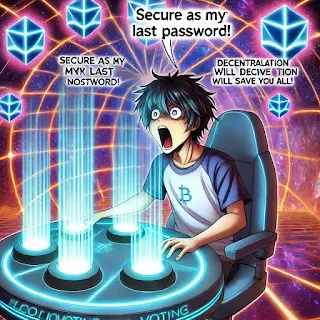### Title:
**Blockchain Voting: The U.S. Government’s Vision for Secure and Transparent Elections**
### Keywords:
blockchain voting, U.S. government, eVote platform, election transparency, digital democracy, Elon Musk, Cardano, Hyperledger, Hedera, identity verification, decentralized voting, election integrity
### Preview:
The U.S. government is exploring the creation of a blockchain-based voting platform, potentially called "eVote," to enhance election transparency and integrity. This ambitious initiative, involving platforms like X (formerly Twitter), Cardano, Hyperledger, and Hedera, could revolutionize how citizens vote and verify their identities. However, it also raises challenges related to technical scalability, trust, and legal frameworks. Will blockchain voting pave the way for a more secure democracy or open the door to new debates?
### Illustration:
A futuristic digital voting booth glowing with holographic blockchain nodes interconnected in a secure network. In the background, symbols of collaboration—logos of Cardano, Hyperledger, Hedera, and X—merge seamlessly. The design should evoke a sense of innovation, trust, and technological progress.
The U.S. government's initiative to explore the possibility of using blockchain technology to create a voting platform represents an ambitious step towards digitizing electoral processes. Let’s analyze the key aspects of this concept:
### Potential Advantages of Blockchain Voting
1. **Transparency**: Blockchain ensures data immutability, allowing participants to verify that their votes are accurately recorded.
2. **Security**: The decentralized nature of blockchain reduces the risks of tampering and cyberattacks.
3. **Simplified Voting Process**: Such a system could significantly improve accessibility, especially for remote areas or citizens living abroad.
4. **Identity Verification**: Integrating technologies like Hedera or Hyperledger could enhance trust in the system by minimizing fraud opportunities.
### Challenges and Risks
1. **Technical Complexity**: Building a scalable and secure platform demands significant resources and expertise.
2. **Trust Issues**: Despite blockchain’s transparency, public skepticism about new technology, especially in politically sensitive contexts, may persist.
3. **Legal Questions**: A comprehensive legal framework is required to address data privacy, voter protection, and other concerns.
4. **Centralization**: The potential involvement of X (formerly Twitter) as a partner may raise concerns over the concentration of power in the hands of a private corporation.
### Political Context
The idea of creating a blockchain-based voting platform may be partially motivated by political calls to ensure greater election integrity. If perceived as a measure to bolster citizen trust, this initiative could enhance the legitimacy of the electoral system. However, its possible association with Elon Musk and his companies might provoke debates, especially among those wary of consolidating technological and political influence.
### Implementation Prospects
Collaboration with blockchain platforms like Cardano and Hyperledger indicates an intent to leverage a wide range of technological solutions. The involvement of Hedera and X suggests a strategy that integrates both public and enterprise blockchain technologies. However, scalability and compliance with international standards remain open questions.
### Conclusion
If the “eVote” project becomes a reality, it could represent a significant breakthrough in digitizing democratic processes. However, its successful implementation will require overcoming numerous technical, legal, and social challenges. The decisions made during the development phase will determine whether blockchain voting becomes a step forward for democracy or a source of new controversies.
### Allusions:
1. **Blockchain and Trust**: References the growing reliance on decentralized technology to solve human errors or trust issues, poking fun at overconfidence in tech.
2. **Anime Exaggeration**: Captures the dramatic, often humorous reactions typical of anime characters to emphasize irony.
3. **Digital Voting Dilemma**: Reflects ongoing debates about the practicality and security of blockchain in voting systems.
---
### Bibliography:
1. Nakamoto, S. (2008). *Bitcoin: A Peer-to-Peer Electronic Cash System*. [Original whitepaper outlining blockchain technology].
2. Chaum, D. (1981). *Untraceable Electronic Mail, Return Addresses, and Digital Pseudonyms*. Communications of the ACM, foundational work on cryptography and anonymity.
3. Reports from trusted tech outlets on blockchain applications in governance and voting, e.g., Forbes, Wired, and academic papers on digital elections.
---
### Hashtags:
#BlockchainVoting #AnimeMeme #Decentralization #Irony #DigitalDemocracy #CryptoHumor #VotingTech #AnimeStyle #TechDebates

Немає коментарів:
Дописати коментар
Pure Acetone: "Pin Tweet to IPFS https://chro…" - Mastodon
https://mastodon.social/deck/@pureacetone/111421706607809813